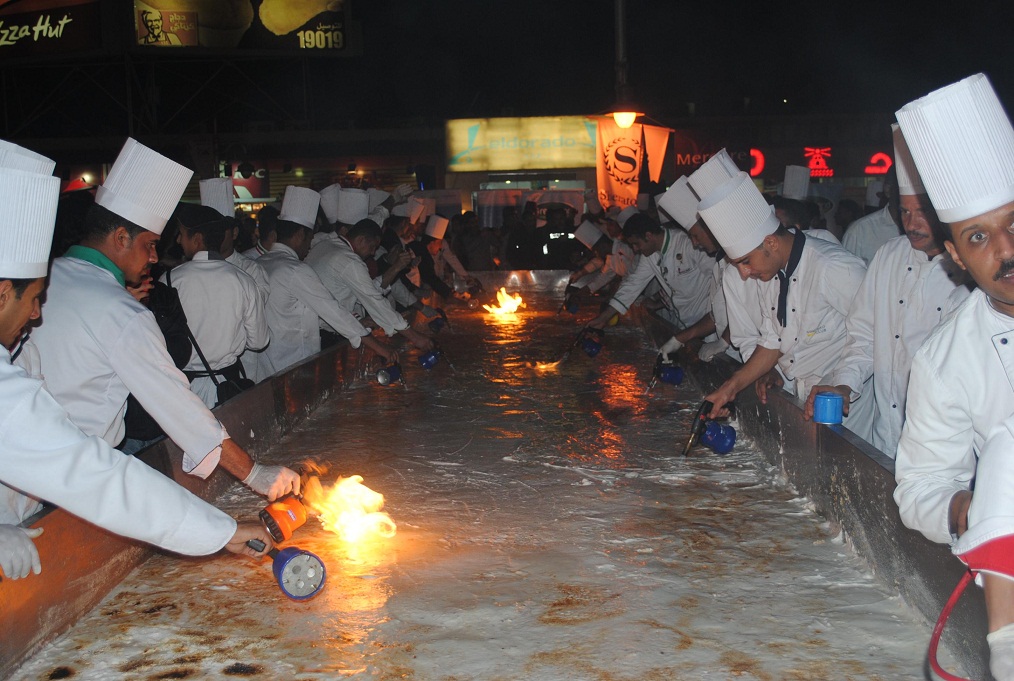Final touches to the Om Ali
By Abdel-Rahman Sherief
Last Tuesday Hurghada hosted a world record attempt for cooking the largest ever Om Ali. Chefs, 450 of them from 45 hotels across Egypt put on their hats and prepared the traditional Egyptian dessert in a specially built tagine, a covered oven dish.
Made from milk, nuts, raisins and filo pastry, according to legend it is named after Om Ali who killed the powerful Egyptian queen Shagaret El-Dor in retaliation for killing her husband the Sultan Aybak. Om Ali invented the dessert and dished it up to the people to celebrate her vengeance.
The Om Ali that was prepared last Tuesday weighed more than seven tonnes and was cooked in a specially built pan 15 metres long and two metres wide. Six large burners heated the tagine. The ingredients used to cook the Om Ali included 6000 litres of milk, 800 kg of filo pastry, 100 litres of cream, 1200 kg of sugar, 50 kg of coconut, 150 kg of mixed nuts and 50 kg of raisins. The total cost of the ingredients for Om Ali was EGP 20,000, which was covered by several Egyptian food and beverages companies and 45 hotels that sent chefs from its staff.
The chefs prepared the dessert in two stages. During the first stage the milk, sugar, filo, nuts and raisins were poured into the enormous pan, which was then gently heated. A second layer of the same ingredients was added to the first after which the whole pan was covered with aluminium foil to create the tagine. Once the mixture was slowly cooked to 70C heavy cream was poured over the top which was then browned by handheld burners.
It took the chefs staff five hours to cook seven tonnes of perfect Om Ali and the finished product was distributed to charities, tourists and passersby.
The reason behind the event to draw attention to the fact that Egypt is a safe holiday destination. “The event was an initiative from the chefs of Hurghada and Egypt to energise the tourism industry,” said Essam Sayed, senior chef in a five star hotel in Hurghada.
A similar event was organised last year when a huge strawberry cake was prepared but unfortunately it failed to achieve a Guinness world record. The chefs have high hopes that this year’s Om Ali will be accepted as a world record by the Guinness organisation.
The event was organised by the ECA, (the Egyptian Chefs Association), which represents around 3200 Egyptian chefs. The ECA manages education and diplomas for its members and holds national culinary competitions for its members. Winners of these competitions go on to represent Egypt in global culinary competitions. The ECA was established in 1997 by Markus Iten, a Swiss chef, who is considered a mentor to Egyptian chefs and who still heads the association.
Om Ali being cooked in tagine
Iten has lived in Egypt for 21 years, after working in South Africa and South Korea. He said the culinary gap between Egypt and South Africa lies in the quality of the food. “Egypt possesses many luxurious hotels with exquisite lobbies and great rooms. The restaurants are well appointed and the food is served well but it is all a façade; the quality of the food in Egypt is still backward,” he said.
Iten thinks that the problem lies in the poor culinary education that is available in the country. “After six months of working in Egypt I realised that there was no proper culinary education here. International chefs know 18 ways of cooking while Egyptian chefs know between six to eight ways only. Students do not get enough practical education; they have information in their minds and they have hands, but they do not know how to use them,” he said.
To turn the tide Iten established his own academy for culinary education which follows the latest international practices and last year 250 chefs graduated from his academy with the same number expected to graduate this year. Iten said the responsibility for education lies with veteran chefs like himself and that opening more academies in Hurghada, Sharm El-Sheikh, Luxor and Cairo will help to increase the numbers of tourists that will visit Egypt. “If nothing changes, in 10 to 15 years from today there will be very little tourism left,” he said.
Last Tuesday also commemorated the national day of the Hurghada governorateand the Russian Egyptian friendship week. Several festivals were held in Hurghada to celebrate these events, including one sponsored by the Freedom and Justice Party under the slogan “Yes for Tourism.” FJP leader Helmy Al-Gazzar accompanied by the secretary general of the Hurghada governorate attended the creation of the Om Ali.
Chef Markus Iten at work
Mohamed Abdul-Aziz, manager of a tourism agency, said it was a good step from the FJP to support the festival and that both the Ministry of Tourism and the media should use the event to reassure foreigners that Islamists are backing tourism. “The main reason behind the decline in tourism activity are the extreme quotes and actions of some fundamental Islamists about tourism, which scared foreigners and prevented them from coming,” he said.
Reservation rates briefly surged after President Mohamed Morsy’s election, but following the presidential palace events last month, it dropped again by 80%. Hurgahda’s streets are normally teeming with tourists, but these days the town is empty, except for the local population and a few foreigners.
“The whole world is witnessing the political turmoil taking place in Egypt. We must reassure the world that Egypt is safe and the ruling party has no hostile position toward foreigners,” said Abdul-Aziz.
Basem Hala’a, the chairman of the Tourism Syndicate, said Egypt’s president must take tourism development seriously and that he should visit all the Egyptian touristic cities and resorts to prove his support of the tourism industry.







